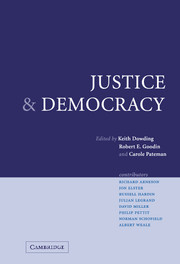Book contents
- Frontmatter
- Contents
- List of figures
- List of contributors
- 1 Introduction: between justice and democracy
- 2 Are democratic and just institutions the same?
- 3 Democracy is not intrinsically just
- 4 ‘The probability of a fit choice’: American political history and voting theory
- 5 Contractarian theory, deliberative democracy and general agreement
- 6 Democracy, justice and impartiality
- 7 Mimicking impartiality
- 8 Justice, democracy and public goods
- 9 The common good
- 10 Individual choice and social exclusion
- 11 Subnational groups and globalization
- References
- Brian Barry's publications
- Index
8 - Justice, democracy and public goods
Published online by Cambridge University Press: 22 September 2009
- Frontmatter
- Contents
- List of figures
- List of contributors
- 1 Introduction: between justice and democracy
- 2 Are democratic and just institutions the same?
- 3 Democracy is not intrinsically just
- 4 ‘The probability of a fit choice’: American political history and voting theory
- 5 Contractarian theory, deliberative democracy and general agreement
- 6 Democracy, justice and impartiality
- 7 Mimicking impartiality
- 8 Justice, democracy and public goods
- 9 The common good
- 10 Individual choice and social exclusion
- 11 Subnational groups and globalization
- References
- Brian Barry's publications
- Index
Summary
It is a curious fact that in the voluminous literature produced over the last quarter century or so on the topic of social justice, the question what, if anything, justice has to say about the supply of public goods by the state has rarely been asked. Social justice has been understood as a set of principles governing the allocation of private goods to individuals. This is very clear, for example, in the case of John Rawls (1971: 90), whose list of primary goods that constitute the subject matter of justice – ‘rights and liberties, opportunities and powers, income and wealth’ (and later the more elusive good, ‘the bases of self-respect) – is a list of goods that are separately assigned to individuals. For Ronald Dworkin (2000: esp ch. 2), justice is to be understood as requiring equality of (privately-held) resources; for Robert Nozick (1974: esp. ch. 2) it is about protecting (validly-acquired) rights of private property; for Bruce Ackerman (1980: 24) it is about individual shares of ‘manna’, an all-purpose resource ‘which can be transformed into any of the familiar material resources of our own world’. And Brian Barry (1991b) himself, although fully cognizant of the important contribution public goods make to the quality of citizens’ lives – his defence of socialism centres on the case for public provision of goods as against market provision – when defining ‘justice’ again cites principles that apply to the distribution of resources among individuals.
- Type
- Chapter
- Information
- Justice and DemocracyEssays for Brian Barry, pp. 127 - 149Publisher: Cambridge University PressPrint publication year: 2004
- 16
- Cited by

